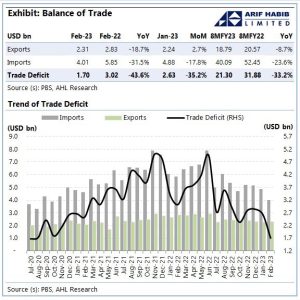Islamabad, March 2, 2023 (GNP): For the sixth straight month, Pakistan’s exports of goods dropped, falling 18.67% annually to $2.30 billion in February, fueling worries about a large-scale industrial layoff.
Exports decreased by 8.65 percent to $18.79 billion during the first eight months of 2022–2023, compared to $20.57 billion in the same period as the previous year. The decline shows that the government would have trouble meeting its export goal for the current fiscal year.
In February, imports decreased 31.51 percent to $4.009 billion from $5.85 billion in the same month of the previous year. From $52.45 billion in the same time last year to $40.09 billion in the first eight months of this year, imports decreased by 23.56 percent.
Also read: Government of Pakistan tax relief for foreign investors
The trade deficit decreased by 33.18 percent, from $31.87 billion in the same months of FY22 to $21.30 billion in FY23.
In February, the year-over-year trade deficit decreased by 43.56 percent to $1.70 billion.
Internal and external reasons that are driving people to worry that industrial facilities, particularly those mostly caused the decline in export revenues producing textiles and clothes, may close.

Except for August, which recorded a minor gain because of the backlog from the previous month, exports showed a decreasing trend in growth in the first month of the current fiscal year, July. A worrisome trend is the contraction of exports, which will make it difficult to balance the country’s external balance.
According to Ijaz A. Khokhar, the former chairman of the Pakistan Readymade Garments Manufacturers & Exporters Association, the government will need to devise some steps to stop the closure of the business.
According to him, the main reason customers have postponed placing orders is the nation’s political and economic unpredictability. Mr. Khokhar advised that the government develop concise declarations to assure overseas customers that their orders will be fulfilled on time.
He stated, “This is a very tough condition,” and added that the government would have to help small and medium-sized businesses. He claimed that if the interest rate is raised further on Thursday, it will be nearly impossible for SMEs to secure access to credit.
Also read: Pakistan inflation all time high- PBS
On Wednesday, the government stopped providing the export sector with subsidized electricity. This will raise the cost of the export industry even more and make it less competitive globally, especially when compared to its competitors from Bangladesh and Sri Lanka.
Buyers, according to Mr. Khokhar, are moving to Bangladesh, Vietnam, and other nations. He added that ministers need to send out favorable messages to foreign buyers to reduce this uncertainty.
Because of recent rating downgrades by international rating agencies, buyers are skeptical of Pakistan’s economy.
Exporters think that fluctuating exchange rates were a major factor in the decline of exports. The government’s decision to stop providing duty deductions on municipal taxes and levies has also generated liquidity issues for the export sector.

